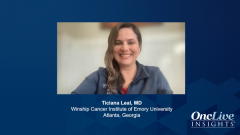
Treatments and Unmet Needs for EGFR-Mutated NSCLC
Expert perspectives on unmet needs and therapies available for patients with EGFR-mutated non–small cell lung cancer.
Episodes in this series

This is a synopsis of an Insights series featuring Ticiana Leal, MD, of Winship Cancer Institute of Emory University, and Sandip P. Patel, MD, of UC San Diego Health Moores Cancer Center.
Associate Professor and Director of the Thoracic Medical Oncology Program at the Winship Cancer Institute of Emory University Ticiana Leal, MD and Professor of Medical Oncology at the University of California, San Diego Sandip P. Patel, MD discussed emerging therapy options, particularly antibody-drug conjugates (ADCs), for epidermal growth factor receptor (EGFR) tyrosine kinase inhibitor (TKI) resistant non–small cell lung cancer (NSCLC).
Dr. Leal highlighted promising results with the anti-HER3 ADC patritumab deruxtecan from the phase 1 HERTHENA-Lung01 study in heavily pretreated EGFR TKI refractory NSCLC. The safety profile was manageable and consistent with less than 10% treatment discontinuation rate. Efficacy and good tolerability supports ongoing phase 3 evaluation. However, Dr. Leal emphasized continued unmet need in the second line and beyond to maintain quality of life after osimertinib progression. Precision medicine guided by longitudinal biomarker analysis remains imperative to uncover resistance mechanisms and match to clinical trials or emerging targeted agents. For oligoprogressive central nervous system-only disease, stereotactic radiosurgery allowing continuation of osimertinib may be utilized. Patient reported outcomes must also be incorporated in studies to ensure therapeutic regimens align with patient priorities and preserve functionality. Insights from advanced stage trials will inform efforts to improve outcomes in early stage resected EGFR mutated NSCLC as well.
Dr. Patel concurred emerging targeted therapies like ADCs hold promise but optimal sequencing and combinations need definition through well-designed clinical trials. Biomarker analysis is integral, not just at diagnosis but also at progression, to enable rational application of novel precision medicine approaches.
*Video synopsis is AI-generated and reviewed by OncLive editorial staff.








































